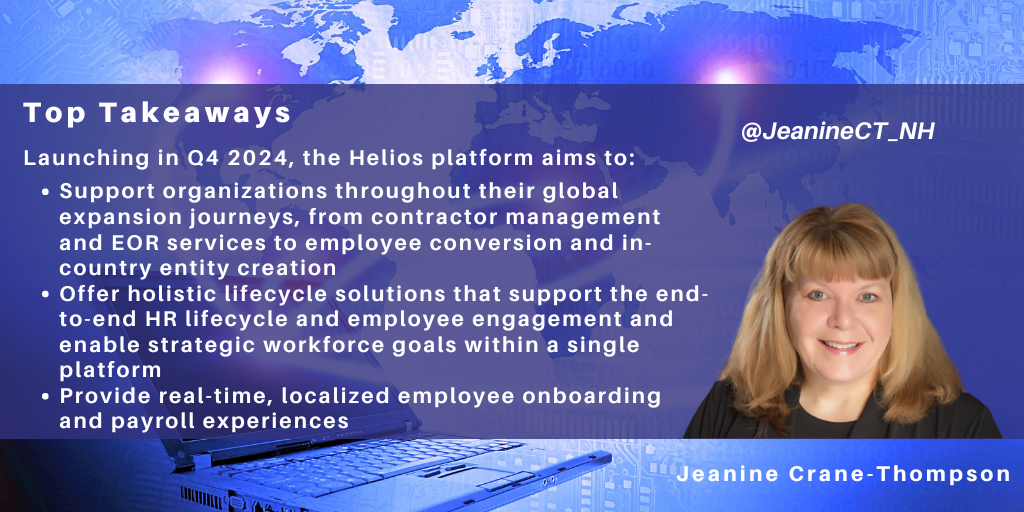posted on Aug 26, 2024 by Jeanine Crane-Thompson

The workplace environment continues to transform, directly impacting the priorities of HCM vendors. Top of mind is ensuring employee engagement and wellness throughout the HR lifecycle, supporting all workplace scenarios (i.e., on-site, remote, hybrid), career tenure, and generational preferences. Organizations are investing beyond mobile-enabled routine task accessibility to provide fitness and emotional wellness nudges, social learning opportunities, and non-traditional benefit enrollment (e.g., pet insurance, fitness memberships, in-office chiropractic care, etc.).
In response to the continued industry evolution, HR industry veteran Rick Hammell is launching a global workforce management and payments startup, Helios. In the post-COVID era, Rick recognized the need for a holistic, single-technology solution supporting organizations as global expansion opportunities were re-energized, including establishing new in-country operations.
The Helios platform aims to support organizations with >100 employees throughout their global expansion journeys, aiming to compliantly manage domestic and international employee populations from onboarding to offboarding. Helios facilitates various global workforce staffing approaches, including contractor management, contractor-to-employee conversion, EOR services, and transitioning from an EOR model to an in-country entity within a single platform. Intended functionality includes onboarding, payroll, performance management, employee engagement via its Communities tool, and payroll with capabilities in 125+ countries. Helios also aims to integrate with other HR systems and LPPs where organizations maintain existing HR infrastructure to deliver consistent user experiences.
Helios seeks to differentiate its offering in a market heavily occupied by recent entrants and mature platforms through its simplified user interface and compliance-focused approach to human capital management and payments processing. Localization and culturalization of fields and user reference materials will further support a remote workforce's user and employee engagement.
Learning in the flow of work is another emerging trend in HR technology, with vendors increasingly supporting workforce skilling and engagement. For example, Helios plans to include field-specific pop-ups providing ready-reference material to educate users on up-to-date country-specific nuances, such as legal, HR, tax, and other regulatory factors.
From his previous HR industry experience, Rick appreciates how culturalization and localization in the flow of work enrich the employee experience. Helios aims to provide a country-specific, role-based platform with localized processes supporting country nuances. The platform includes an integrated Communities tool providing a tailorable organizational portal designed to help unify teams and promote remote workforce engagement.
Vendors are applying advanced technologies throughout the HR technology markets, including GenAI and ML, automating and streamlining HR operations, driving process efficiencies and savings, with in-platform accessibility to live support available to provide personalized service and engagement for employees and users. Response times vary depending on established program SLAs. Within Helios, the planned application of GenAI supports compliance, employee engagement, and performance excellence. Examples include salary benchmarking, HR task and platform updates, and country-specific insights informing the client during onboarding. The platform also generates operational performance metrics identifying trends and opportunities for improvement based on competitor targets within their industry, country presence, or company size.
With the increased integration of GenAI and enhanced predictive analytics into HR technology and workforce management solutions, providers face challenges in ensuring the balance between using these technologies and resolving complex circumstances using human judgment. They must also ensure compliance and privacy when sensitive data are shared and stored via these channels. Helios aims to protect, understand, and validate data to ethically and securely train their AI models, ensuring a balance between leveraging emerging technology and maintaining compliance. It will also employ strict controls to protect sensitive employee data and ensure privacy through advanced encryption, strict access controls, data masking, regular security audits, endpoint protection, and detailed data privacy policies compliant with local privacy laws.
The planned release date for the Helios platform is Q4 2024. The company is engaging with several Fortune 500 companies to complete beta testing with a view to strengthening its initial business development pipeline and prospecting targets.
